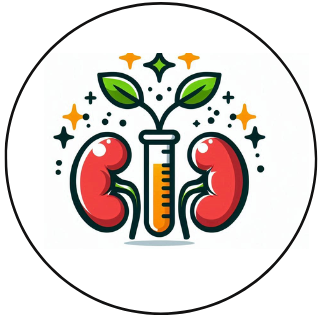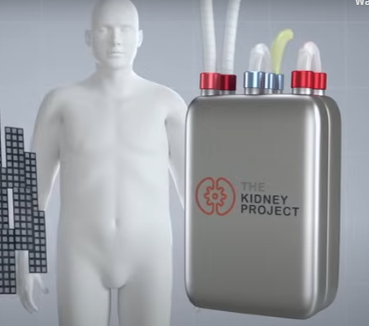In my research, I recently came across a very exciting development in kidney health and treatment. The University of California San Francisco (UCSF) has what they call the Kidney Project. The researchers have developed and are now in clinical trials of an artificial kidney that could have amazing implications for kidney patients. If there are any mis-interpretations in this post, they are due to my lack of knowledge with is device and the process of progression. I will leave a link to the UCSF site, to any that wishes to read further and discover. The site includes a link to a youtube video explaining much about the device.
The Artificial Kidney: A Breakthrough in Kidney Health by The Kidney Project at UCSF
In the ongoing battle against kidney disease, one promising solution is gaining traction: the artificial kidney. Developed by The Kidney Project at the University of California, San Francisco (UCSF), this innovative device offers new hope for patients suffering from chronic kidney disease (CKD) and those waiting for kidney transplants. By creating a wearable, fully functional artificial kidney, UCSF researchers aim to revolutionize kidney health management and offer an alternative to traditional dialysis or kidney transplantation.
A Brief History of The Kidney Project
The Kidney Project began in 2008 as a groundbreaking initiative to develop an artificial kidney capable of replicating the essential functions of the human kidney, including filtration, regulation of fluids, and waste elimination. The project’s ambitious goal was to provide an alternative to dialysis, a life-saving but burdensome treatment that involves filtering waste from the blood when the kidneys are no longer able to perform this function. Dialysis requires frequent visits to medical centers, often leaving patients with limited freedom and quality of life. In recent years home dialysis has become available. It is still burdensome and life limiting, but less so than having to go to a center.
Led by Dr. Shuvo Roy and Dr. Ronald G. Pereira, the UCSF team set out to create a kidney that would function autonomously and be small enough to be worn outside the body. Their work combines bioengineering with cutting-edge technology to replicate the natural processes of the kidney, including filtration and ultrafiltration, within a compact and wearable device.
The Progress of The Artificial Kidney: From Concept to Clinical Trials
Over the years, The Kidney Project has made significant strides in perfecting the artificial kidney. One of the most important developments has been the creation of a “bioreactor,” which uses living human kidney cells to perform critical functions. These cells are housed in a small, implantable device that can filter waste from the bloodstream in a manner similar to a healthy kidney.
As of recent years, the artificial kidney prototype has moved from the laboratory to animal testing with impressive results. The team has shown that the device works effectively in pre-clinical trials, filtering out toxins, balancing electrolytes, and mimicking kidney function in pigs, which are biologically similar to humans.
The current phase of the project focuses on preparing the device for human testing. In 2020, UCSF received approval from the U.S. Food and Drug Administration (FDA) to begin clinical trials. This marks a pivotal moment in the project’s journey, as the artificial kidney progresses from an experimental concept to a potentially life-changing reality for patients.
Human Testing: The Next Step in Kidney Transplant and Recovery
As of now, The Kidney Project team has successfully implanted the artificial kidney into a small group of human patients, marking an exciting new chapter in the search for alternatives to dialysis and kidney transplants. While these trials are still in their early stages, early results show promising signs. The device has demonstrated the ability to filter waste and perform basic kidney functions in people, offering hope that this artificial solution could one day eliminate the need for dialysis or long-term immunosuppressant medications after a kidney transplant.
For patients who are currently waiting for a kidney transplant, this could be a game-changer. The growing shortage of donor kidneys has led to long waiting times and a high level of uncertainty. Finding a donor kidney that is a match for the kidney patient is also a factor that influences the time on the waiting list. The artificial kidney may provide a solution by potentially reducing the dependence on organ donations. It may also offer a solution for those who are unable to undergo kidney transplantation due to medical complications, allowing them to lead healthier, more independent lives.
Moreover, for those who are recovering from kidney transplant surgery, the artificial kidney may ease the burden on the new kidney, helping to ensure optimal function and reduce the risk of complications. Kidney transplant recovery often involves a rigorous post-surgery care plan, and an artificial kidney could complement this process by enhancing overall kidney function and providing additional filtration support during the critical recovery phase.
The Future of Kidney Health: Endless Possibilities
While the journey is far from over, the progress made by The Kidney Project offers an exciting glimpse into the future of kidney health. The potential of a fully functional, wearable artificial kidney could transform the landscape of kidney care, offering a new lease on life to millions of people struggling with kidney disease. In the coming years, as human trials continue and the technology matures, the artificial kidney could emerge as a revolutionary tool in both kidney transplant recovery and the treatment of chronic kidney disease.
For those living with kidney disease, the advent of such a technology is a beacon of hope. As The Kidney Project pushes the boundaries of medical innovation, the artificial kidney might soon become a critical part of the fight against kidney failure and a major step toward improving the lives of millions worldwide.
As promised, I am leaving a link to UCSF Kidney Project. Click on the link to learn more.

